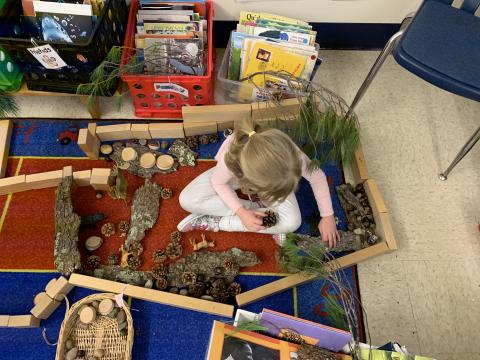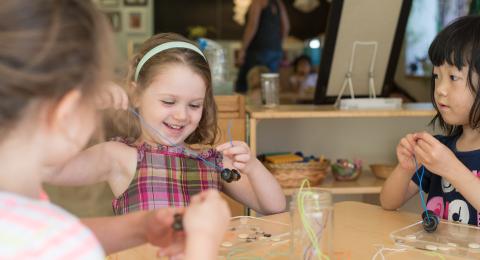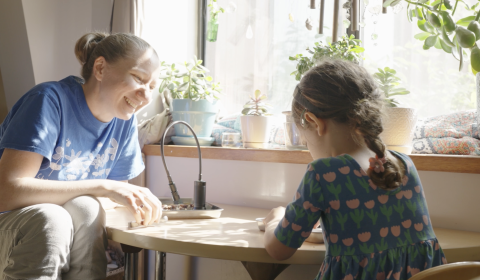The Benefits of Play
- Children’s development flourishes through diverse, skill-building play experiences. Research highlights that play enhances social-emotional, cognitive, language, and self-regulation skills—foundations vital for brain and executive function development.
- Play-based learning fosters stable, nurturing relationships, essential for children’s well-being, while encouraging skills and knowledge transfer across content areas in natural, meaningful ways.
- Children need a variety of skill sets to optimize their development. Research shows that developmentally appropriate play with adults and other children provides opportunities to build the social-emotional, cognitive, language, and self-regulation skills that lead to executive function and brain development.
- Play helps children build the safe, stable, and nurturing relationships with caregivers and other children that they need in order to thrive.
- Play-based learning serves as a vehicle for children to develop new skills while also transferring knowledge and skills across content areas through natural, authentic, and meaningful use and integration.
- Play-based experiences offer children opportunities to build upon their natural curiosity, to explore, discover, and make sense of the world around them.
The Continuum of Play-based Learning
Play-based Learning takes on many forms, ranging from free play to teacher-directed play. These various forms of play are largely defined and distinguished by the level of child agency and the role of the adult within the experience. While research has shown that children benefit in different ways from all forms of play across the continuum, guided play experiences yield the most impactful learning and developmental outcomes for children (Zosh et al., 2016).
It is well-established that children benefit most when education:
- is active with room for discovery and experiential learning through inquiry and reflection
- is consistently engaging without distraction
- is made meaningful through connections between new and prior knowledge gained inside and outside the classroom
- is socially interactive with peer collaboration and adult support
- is an iterative process with opportunities to develop, test, and revise hypotheses about how the world works
- is joyful.
These playful learning principles and features of the learning environment enable students to gain six 21st century skills identified as the “6 Cs”: collaboration, communication, content, critical thinking, creative innovation, and confidence.
LEARN MORE ABOUT THE PLAYFUL LEARNING PRINCIPLES AND 6CS
References
Golinkoff, R. M., & Hirsh-Pasek, K. (2016). Becoming brilliant: What science tells us about raising successful children.American Psychological Association.
Hirsh-Pasek, K., Hadani, H. S., Blinkoff, E., & Golinkoff, R. M. (2020). A new path to education reform: Playful learning promotes 21st-century skills in schools and beyond (Big Ideas Policy 2020 Report No. 28). The Brookings Institution.
Hirsh-Pasek, K., Hadani, H. S., Blinkoff, E., & Golinkoff, R. M. (2020). A new path to education reform: Playful learning promotes 21st-century skills in schools and beyond. (Big Ideas Policy 2020 Report No. 28). The Brookings Institution.
Zosh, J. M., Hirsh-Pasek, K., Hopkins, E. J., Jensen, H., Liu, C., Neale, D., Solis, S. L., & Whitebread, D. (2018). Accessing the inaccessible: Redefining play as a spectrum. Frontiers in Psychology, 9, Article 1124. https://doi.org/10.3389/fpsyg.2018.01124
Play-based Legislation
The State of New Hampshire is at the forefront of educational reform, with leaders actively and passionately supporting Early Childhood Education and the implementation of best practices statewide. In 2018, a bi-partisan bill amended NH’s RSA 193-E:2-a, the Substantive Educational Content of an Adequate Education law, to state:
"Instruction in support of kindergarten standards shall be engaging and shall foster children’s development and learning in all domains including physical, social, cognitive, and language. Educators shall create a learning environment that facilitates high-quality, child-directed experiences based upon early childhood best teaching practices and play-based learning that comprise movement, creative expression, exploration, socialization, and music. Educators shall develop literacy through guided reading and shall provide unstructured time for the discovery of each child’s individual talents, abilities, and needs."
VIEW NEW HAMPSHIRE'S TECHNICAL ADVISORY FOR HB1499

Creating Coherence and Sharing Best Practices
In an effort to provide greater conceptual clarity around play-based learning—supporting practice-based coaching efforts and promoting a shared understanding among stakeholders across New Hampshire, in alignment with NH HB1499 and NH Preschool Development Grant goals—the UNH Early Learning Coaching Team developed the following working definition, which highlights the unique benefits of guided play and clarifies the roles of both adults and children within this approach:
Play-based Learning Defined
Children naturally learn through play by engaging in and making sense of their world. Play-based learning is self-chosen, enjoyable and process-oriented. These opportunities are experiences that are child-directed and teacher-facilitated in which teachers take an active role as intentional planners, observers and guides. Learning through guided play opportunities specifically maintains the joy of free play while allowing children to connect authentically with content. When children co-construct their learning with their teachers and peers, they apply it to their own lives making meaningful, personal discoveries as they progress towards learning goals.

